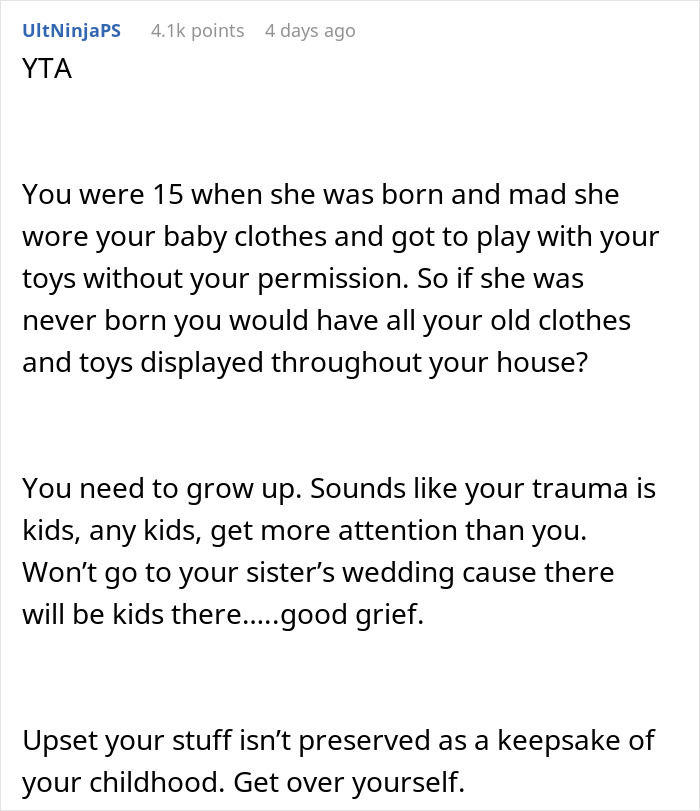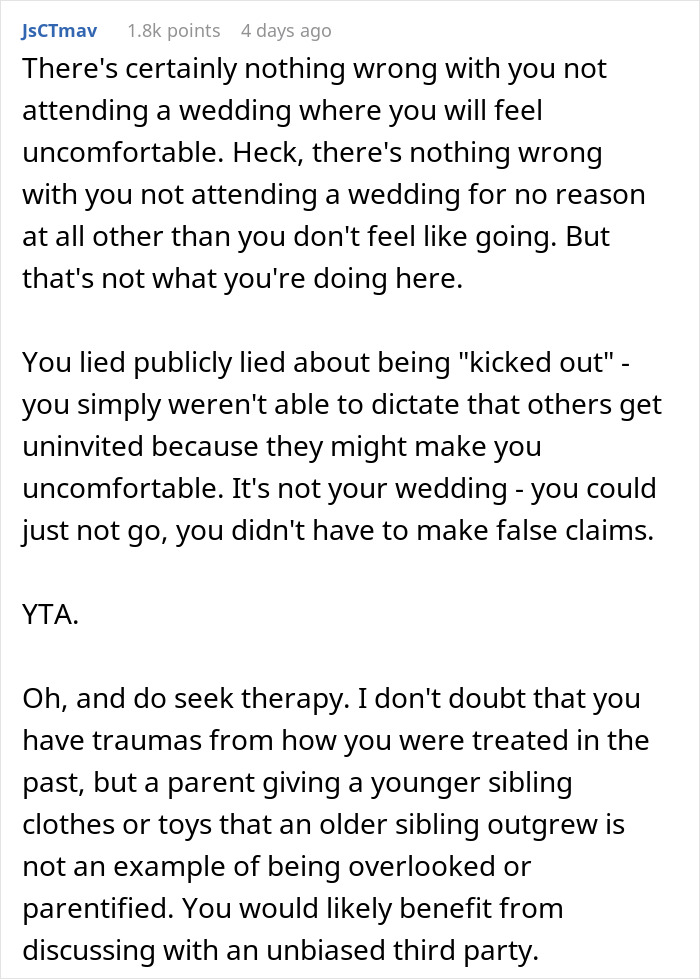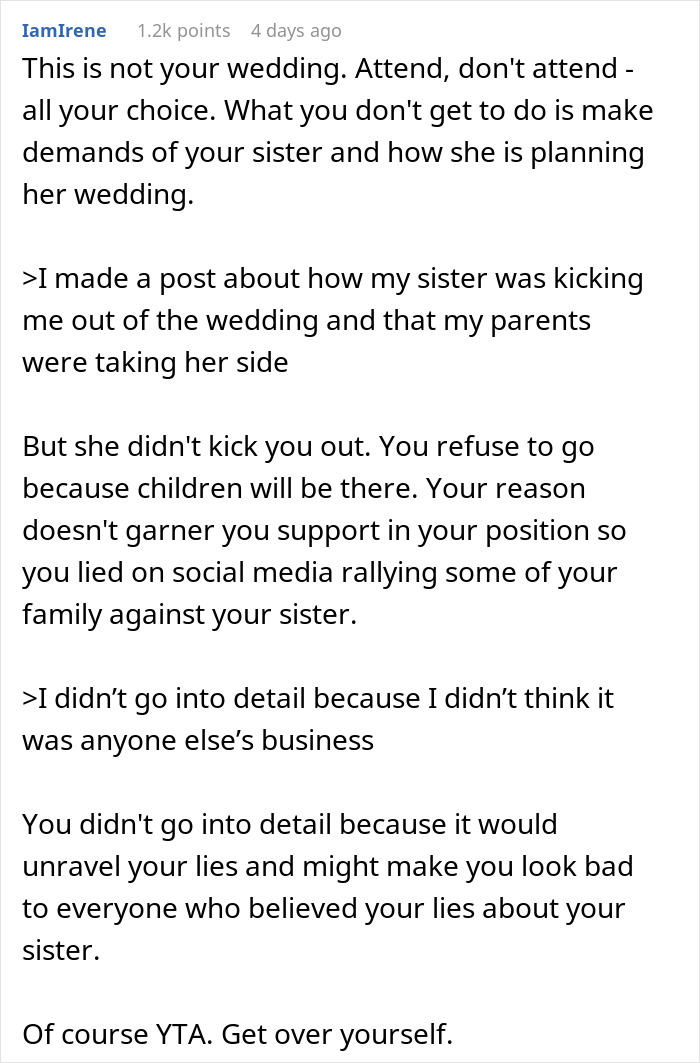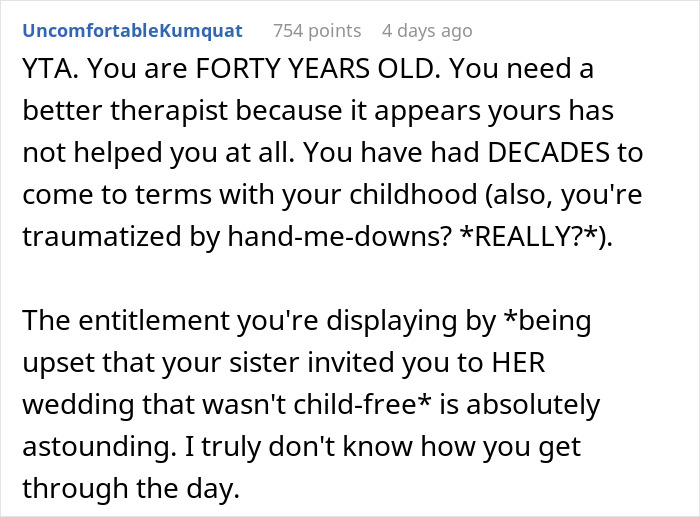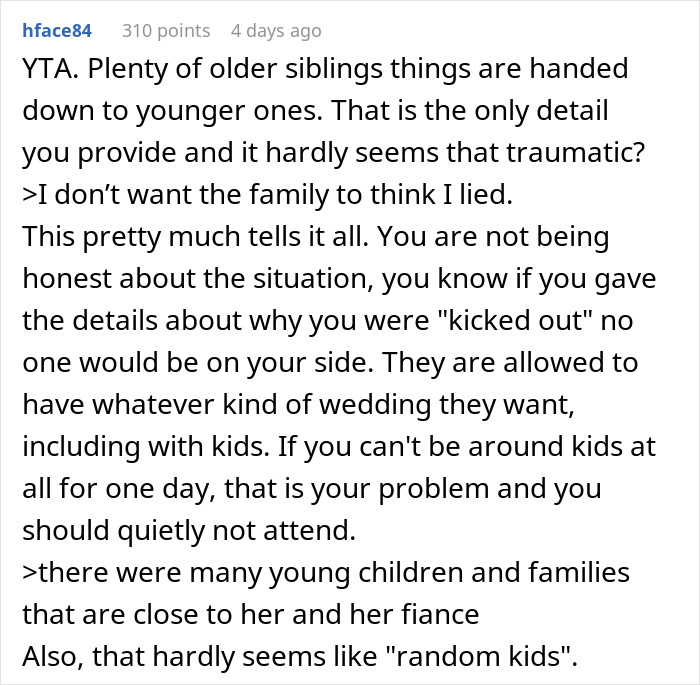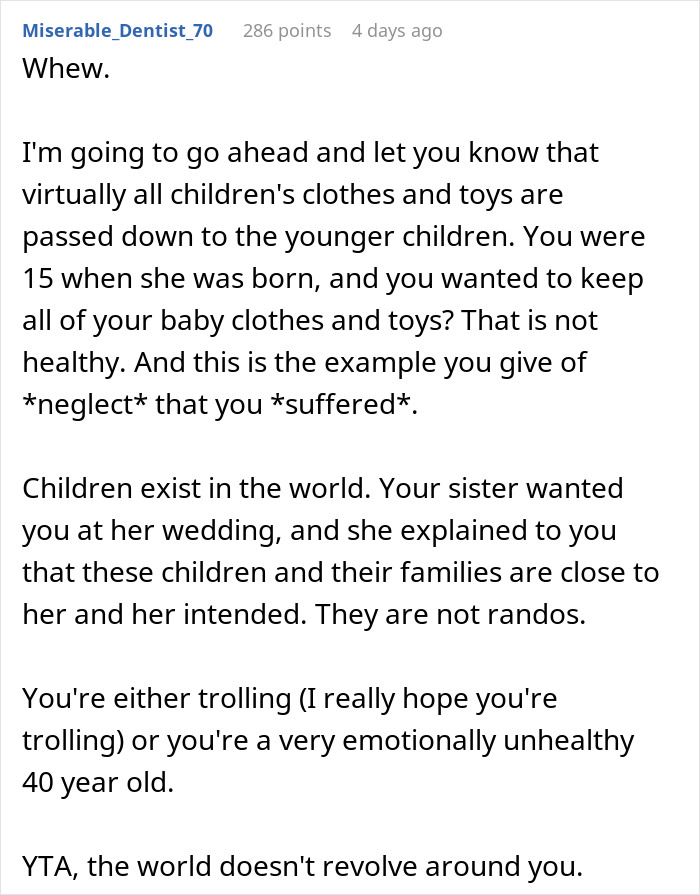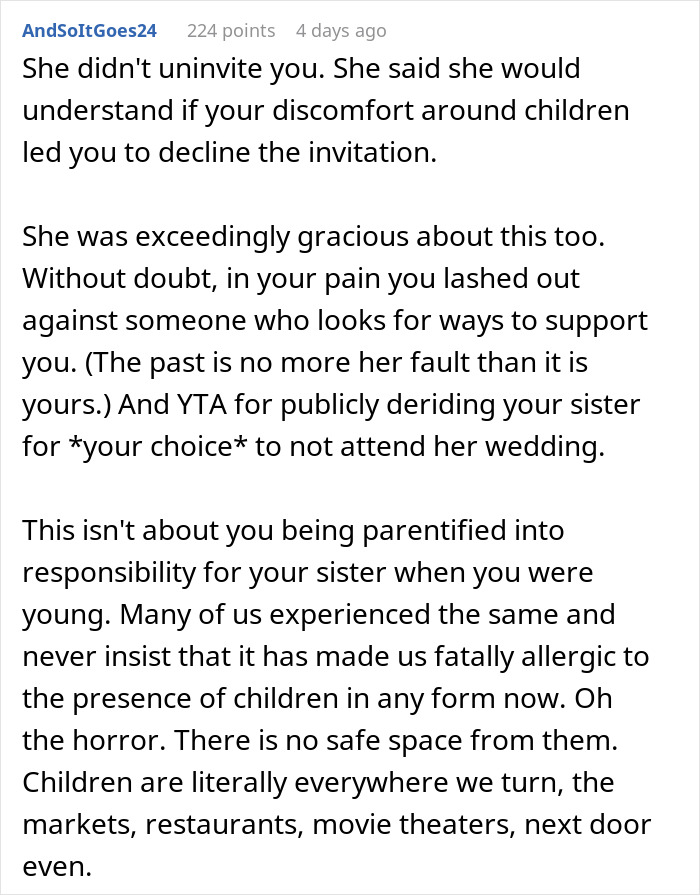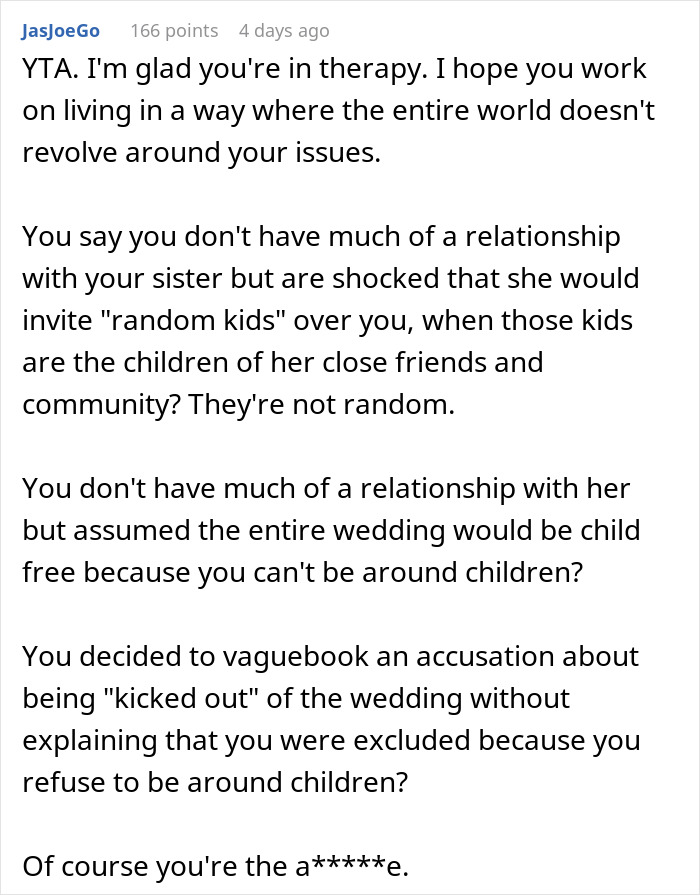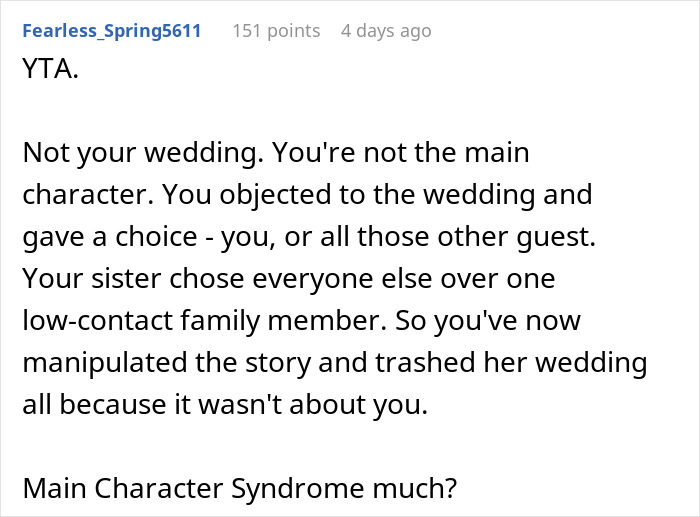It means the world to marrying couples if their loved ones can make it to their wedding. After all, it makes sense that they want their nearest and dearest to witness their celebration of love. However, when the guests start making unreasonable demands, it can lead to a lot of hurt feelings—on all sides.
One anonymous woman turned to the AITA online community for their verdict after she was uninvited from her sister’s wedding and then stirred up some drama. Many internet users were shocked by her behavior and were candid about their take on the situation. Scroll down for the full story, as well as the response from the internet.
Bored Panda wanted to learn more about sibling rivalry, so we reached out to Corinna Jenkins Tucker, Ph.D., C.F.L.E. She was kind enough to shed some light on this topic. Tucker is the Director of the Sibling Aggression and Abuse Research and Advocacy Initiative (SAARA), which is located at the Crimes against Children Research Center, University of New Hampshire. You’ll find the insights she shared with us below.
Marrying couples are in charge of curating the guest list, however, this can unintentionally lead to some tension

Image credits: Emma Bauso / Pexels (not the actual photo)
One woman shocked the internet after she revealed how she let her rivalry with her sister, who is getting married, get out of hand

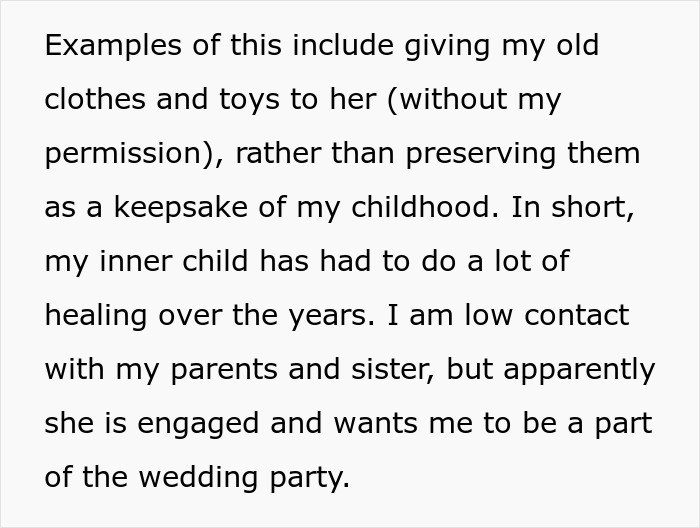
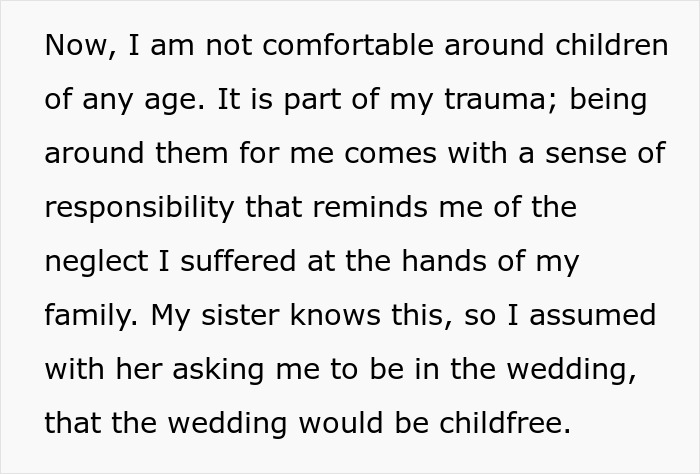

Image credits: Justin Clark / Unsplash (not the actual photo)

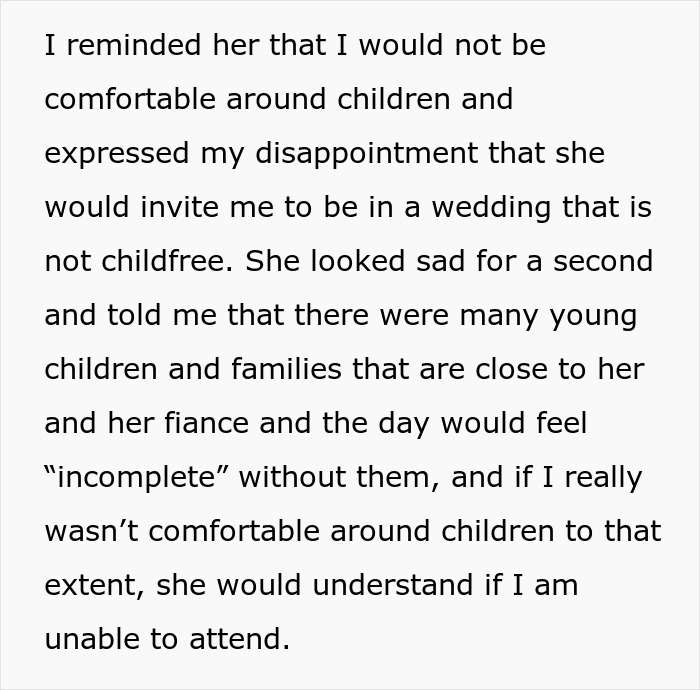
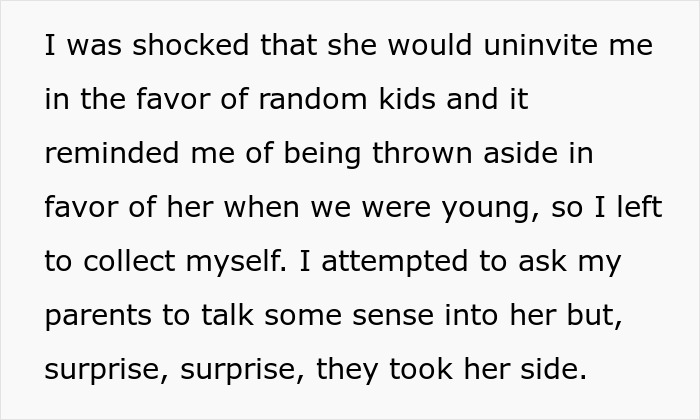

Image credits: Engin Akyurt / Pexels (not the actual photo)
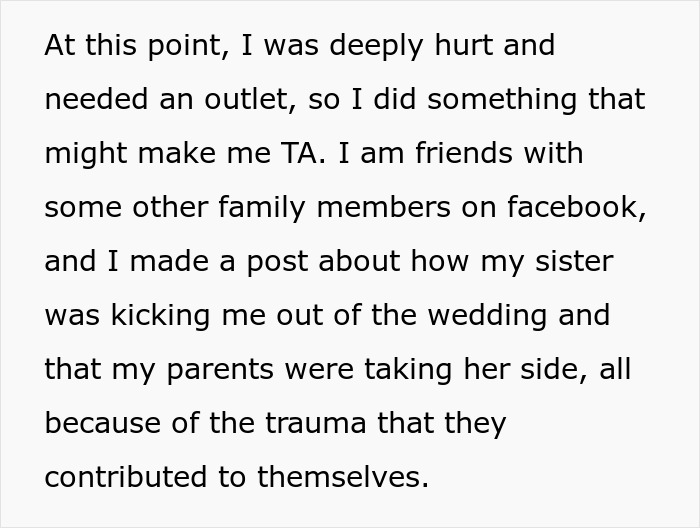


Image credits: cottonbro studio / Pexels (not the actual photo)
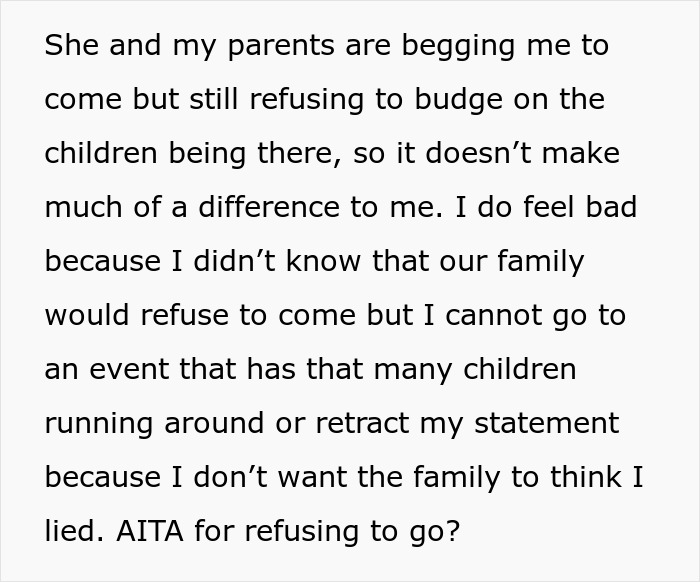

Image credits: Old-Direction2968
Image credits: Vlada Karpovich / Pexels (not the actual photo)
Couples shouldn’t feel pressured to change their entire wedding just because one person is unhappy
According to the author of the anonymous post, her sister should have taken her feelings into account and thrown a child-free wedding. While some couples do decide to organize child-free weddings, and there are some pros to doing this, nobody should feel like they’re forced to make the decision.
Organizing a wedding is about finding a nice balance between how the happy couple envisions what’s supposed to be the happiest day of their lives and what their guests would enjoy. Ultimately, the marrying couple has the final say about who gets invited and what the general theme of the wedding is. As for the details, they can alter some of them to better suit the needs of their guests and make them feel more comfortable.
Not inviting kids because one of your family members dislikes them would mean upsetting lots of other guests instead. At the end of the day, everyone is free to organize their own child-free weddings if they want it. However, they shouldn’t demand that others massively change their plans for the wedding and the guestlist due to their personal mental health and emotional issues.
The entire drama didn’t stop there, however. Instead of graciously bowing out of taking part in the wedding, the author of the post shared how she then stirred up drama on social media on purpose. She made herself look like the victim. Meanwhile, many of her sister’s guests are now refusing to attend.
The AITA online community was absolutely horrified by what happened. Many redditors called the OP out for being entitled and manipulative. Others suggested that she seek professional help from mental health specialists.
Meanwhile, some internet users suggested that the OP might have been jealous of her sister and wanted to draw more attention to herself.
Image credits: FamilyStock / Envato Elements (not the actual photo)
The intent to harm is what separates sibling rivalry from aggression and abuse
According to Tucker, the Director of SAARA, there are numerous reasons why siblings may feel resentment toward each other. These include jealousy, unfavorable treatment by parents, as well as one of the siblings being aggressive or abusive toward the other.
Sibling rivalry, aggression, and abuse are different things. Rivalry mainly focuses on competition for or protests about parents’ or caregivers’ attention, favor, and resources. Aggression is behavior that is intended to cause either physical or emotional harm. Meanwhile, abuse is behavior that causes or has a high likelihood of causing physical or emotional harm.
“Rivalry is about finding unique successes or developing personal qualities that make a person different from their sibling to capture parents’ attention. Too much rivalry can lead to aggressive behavior,” Tucker explained to Bored Panda via email.
“Before that happens, parents can help with perspective-taking skills and using mediation techniques to help settle conflicts.”
We asked Tucker about when someone can tell that a line has been crossed when it comes to sibling rivalry.
“When the behavior has an intent to harm, then a line is crossed. When the aggression becomes severe, one-sided, and part of a pattern, that is abuse. The harmed sibling may feel tormented,” she said.
“Others (e.g., parents, other siblings) and professionals may need to help with recognition if the harmed sibling does not realize what is happening. In the case of abuse, outside professional help is needed, and reconciliation may not be possible.”
Image credits: Pressmaster / Envato Elements (not the actual photo)
Even though sibling rivalry can be found in many families, it can sometimes get out of hand
Sibling rivalry is not uncommon. However, it can be very unhealthy if it goes too far. Verywell Mind points out that some of the signs of such rivalry include jealousy, bragging, showing off, as well as a strong focus on competition.
On top of that, siblings who compete with one another do so for their parents’ attention and support. If taken too far, sibling rivalry can lead to family members not treating each other as equals, even as adults.
In some cases, siblings actually see each other as enemies and try to undermine them in whatever way possible.
The best thing to do in these cases would be to get together and talk things out. Get to the root of the problem. Try to reconcile your differences. Genuinely and actively listen to each other instead of accusing one another about ‘always doing this or that.’
Now, let’s not be naive: that’s easier said than done. In more serious cases, folks may need to go to therapy for a long time to change their perspective and heal their relationships with their relatives.
Alternatively, they may need to decide to reduce the amount of contact they have if they feel that their differences are irreconcilable. However, that means being polite and tolerant when contact does happen. Actively harming each other is not going to make anyone happy.
Most readers were very critical of the author. Here’s what they had to say about the entire drama





